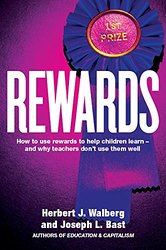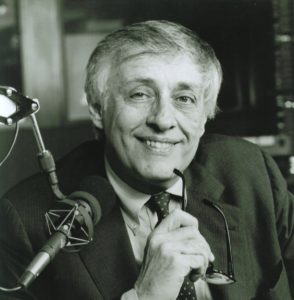If Anything Can Go Wrong…
With four expert commentatorsNever was Murphy’s Law more applicable than in the ravaging storm called Katrina which came close to destroying New Orleans and environs. A year later the country was still reeling and struggling with accusations of “racist indifference” and governmental incompetence. In 2006 we were joined by
four excellent discussants, both scientific and journalistic, discussing the what, why and who of the disaster.

Miseducation: How “Reward” Punishes
With Herbert Walberg and Joseph BastThe scandal in our public education is most obvious in the schools of the “inner city,” but also bedevils most of the rest of the schools of comparatively affluent America. Why and how? Through the injurious effects of “niceness” and “educational egalitarianism.” Not only is no child to be left behind, he or she is to be given no honest evaluation of performance, attainment and progress. Instead, all are “rewarded” promiscuously for whatever the teacher can find to praise, be it some “alternative”intelligence, “empathic relatedness,” or just being there. By no means must the child ever be allowed to recognize that he or she has performed poorly on any task or has not given enough effort or attention.
Thus, according to our guests, Herbert Walberg and Joseph Bast, have the teacher’s colleges and the two major teachers unions kept this country – which spends more on education than any other – at the mere middle of the educational attainment distribution, exceeded by virtually all western European nations plus, of course, China and Japan.
The answer is not to give up the uses of reward in education but to connect it to actual merit, to eschew false flattery for simple realism and honest evaluation. Strengthening the curriculum and raising standards would also be –to say the least–helpful. All of this is well argued and elaborated in a new book by Walberg and Bast and in this episode.

Liberalism, Conservatism And Kindness
With William VoegeliThat title is prompted by a great quotation that I only recently encountered: “Liberalism is the politics of kindness.” The source is Garrison Keiller, the sage of Lake Woebegone, and I found it in William Voegeli’s new book, “The Pity Party” by which he means to convey his summary judgement of the Democrats.
His argument, most colorfully and baldly stated in the book, is that the modern Democrats have been running a sort of extended con-game in which both their rhetoric and some of their vaunted legislation promise to relieve the disappointment, deprivation, suffering and humiliation of the “disadvantaged.” But, as he argues, in reality, things often get worse for those who supposedly benefit. Still, the counter-argument runs that conservatives don’t care about the burdens placed on working-class people – that being the operative meaning of “middle class” these days – or on minorities and the truly indigent. Conservatives, whether of the established party, Tea Party or Libertarian party, are seen as rather cold-hearted, lacking in empathy and blindly loyal to the near-religion of the free market.
This is one side of the politics of mutual defamation. Voegeli has done half of the job and done it very well. Here he is in a conversation in which the proprietor required himself to take the role of the defender of the works and ways of liberalism.
Does Voegeli, a senior editor at the Claremont Review of Books, in fact hit the mark?
The Press And The President
With Bernard GoldbergHere’s Bernard Goldberg, formerly of CBS television, and the author of various indignant (but funny) book-length screeds We talked in 2009 at which time he had “nothing against Barack Obama,” but much against the press’s love affair with him. Apart from Goldberg’s contempt for his former colleagues, he conveys strong admiration (verging on secular apotheosis) for Obama at the very beginning of his presidency.
Between his fascination with Obama and his contempt for his erstwhile colleagues in the press (particularly “electronic”). But that was in 2008. From his grudging admiration for Obama shortly after the election and his continuing contempt for much of the print and electronic press, he went on from this broadcast occasion, to became one of the most critical of the Fox News commentators.
Courtroom Strategies And Poker
With Steve Lubet, Sean Berkowitz and Chris LyndSteve Lubet, one of the guests on this program from 2006, had just written a book titled “Lawyer’s Poker.” He and two other experienced trial attorneys tell vivid tales from the courtroom and they do tend to verify the saying that “a trial does not determine who is right but who had the best lawyer.”
The Children Of Divorce
With Alan Carlson and Elizabeth MarquardtThere is much lore – story after story after story – about the injury that divorce delivers to the children of the now dissolved marriage. Is this 2006 discussion we examine the actual research on the “dysfunctional” consequences for the children. Our two guests are among the most salient researchers. Alan Carlson is Director of the Howard Center for Religion and Society; Elizabeth Marquardt had just completed a major study on children of divorced parents. We start with the startling assertion that, since it’s inception, “No Fault Divorce” has quite significantly increased the divorce rate.
Origins Of Language And Languages
With Frederic Schwink and Jason MerchantWhen did language in its “modern” form – that is, with grammar, syntax and extended vocabulary – actually come from, in both space and time? How do languages such as French, Spanish, Portuguese, Romanian and Romansch differentiate from a common source, Latin? Why do children acquire second or third languages much more easily than adults? Our guests are both leading linguistic scholars: Fred Schwink of the University of Illinois and Jason Merchant of the University of Chicago in this 2005 discussion. Incidentally, we try out some great tongue-twisters and try to identify some languages offered by callers.
Sherlock Holmes Lives!
With Thomas Joyce, Susan Diamond and Eli LiebowThe thousands of Holmesians in the world live by that precept. They know that Holmes, who retired 80 years ago, now lives in Sussex where he is a devoted beekeeper but still takes on occasional crime cases. Three of those students of the past and continuing career of Holmes joined us in this discussion. Though it occurred way back in 1994, the astonishing revelations presented that night still resonate.
Can The Universe Be Comprehended?
With Joel Primack and Nancy AbramsAmong the major figures who have tried to understand it “all” is Joel Primack, physicist at the University of California. He helped discover the “dark matter” of which 25 percent of the universe is composed. He and his wife, Nancy Abrams, joined us in this 2006 conversation to discuss their book, “The View From The Center of the Universe.” Among the less-than-trivial questions addressed are: how did the universe begin? How is it structured? What purpose, if any, does it reveal? What does it suggest about a transcendent power or powers? Does it have any neighbor universes? Once again we find that the best way to stretch the mind is through cosmology.
Like Us on Facebook
New title
Latest News

Welcome to The Milt Rosenberg Show
This website is the home of The Milt Rosenberg Show.…
Milt Rosenberg Obituary
Facebook Like Widget
Shows By Topic
Shows by Topic
- arts + letters (84)
- arts+letters (1)
- business (5)
- chicago (10)
- crime (13)
- current events (81)
- economics (18)
- education (18)
- global affairs (105)
- health + healthcare (19)
- history (150)
- humor (18)
- language (14)
- law (7)
- media (28)
- music (5)
- philosophy (19)
- politics (120)
- religion (45)
- science (52)
- social science (22)
- technology (4)



